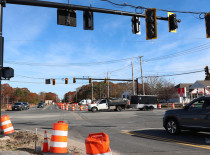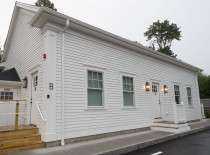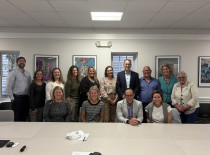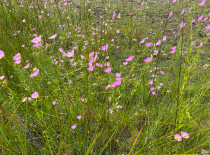All Posts
Communities across Cape Cod continue to advance a wide range of roadway, safety, and multimodal improvements. The following project updates summarize current construction activity, recently completed milestones, and upcoming work for major state and local transportation projects that are funded through the region’s Transportation Improvement Program.
This Regulatory Update provides a status on projects currently under review by the Cape Cod Commission. Visit www.capecodcommission.org/regulatory for a full overview of our Regulatory program and answers to frequently asked questions.
Recently, Commission transportation staff completed two regional inventory projects designed to inform future transportation improvements: an inventory of municipally owned bicycle racks and an inventory of overhead flashing beacons. Both efforts were funded through the 2025 Unified Planning Work Program (UPWP), which supports transportation planning initiatives throughout Barnstable County.
Cape Cod’s architecture helps define its sense of place. The thousands of historic structures in the region do more than recall the past, they define how the Cape looks and feels today. Historic buildings are more than just the backbone of Cape Cod’s distinct character; they are the foundation for our community’s identity. Future development and redevelopment efforts are rooted in preserving the character and identity that make Cape Cod unique.
Hundreds of Geographic Information Systems (GIS) professionals gathered in Falmouth this week for the annual New England Arc Users Group fall conference, an event designed to build connections and advance professional growth. The Cape Cod Commission was well represented, with staff showcasing how GIS technology supports planning, environmental stewardship, and storytelling across the region.
Cape Cod Commission staff and the Barnstable County Economic Development Council (BCEDC) recently welcomed newly appointment Massachusetts Economic Development Secretary Eric Paley and Undersecretary Ashley Stolba for a discussion on Cape Cod’s economic challenges and opportunities. The conversation brought together state and regional leaders to explore workforce needs, housing pressures, innovation, and long-term strategies for sustaining a vibrant year-round economy.
Recognizing the important ecosystem services native plants provide, Commission staff are developing an updated list of native plants for use in local and regional planning. Using the comprehensive plant list featured in the Cape Cod Freshwater Pond Buffer Guidance as its foundation, the updated list will include additional native species and indicate which are suited for upland and coastal environments as well as freshwater pond buffers. Created as part of the Freshwater Initiative, the Pond Buffer Guidance highlights the ecological benefits of native plants and their role in supporting healthy habitats.
The Mass Broadband Institute (MBI) is offering the Connected & Online Program, a new initiative that will distribute up to 27,000 internet-enabled devices, along with assistive technology and supportive equipment, to eligible organizations across Massachusetts. The goal of the program is to expand access to education, workforce training and telehealth by establishing public device lending programs and on-site device stations, especially in Gateway Cities and rural communities. Devices will be fully loaded with software, selected accessories and warranties at no cost to awardees. Funding is provided by the U.S. Treasury Capital Projects Fund (CPF).
During a meeting held on October 20, 2025, the Cape Cod Metropolitan Planning Organization (MPO) released the Federal Fiscal Year (FFY) 2026-2030 Transportation Improvement Program (TIP) Amendment 1 for a 21-day public review and comment period. A copy of the document may be downloaded at www.capecodcommission.org/mpo. Amendment 1 proposes to increase statewide TIP funding for the Harwich Elementary School, Safe Routes to School Improvement project (610670) in FFY 2026 to match the updated cost estimate of $3,538,233.
Natural systems are central to Cape Cod’s identity and resilience, shaping the region’s environment, economy, and quality of life. A series of lightning talks by Commission staff highlighted efforts to protect ponds, enhance outdoor access, and build resilience in the face of climate stress, sharing practical actions communities and residents can take.










